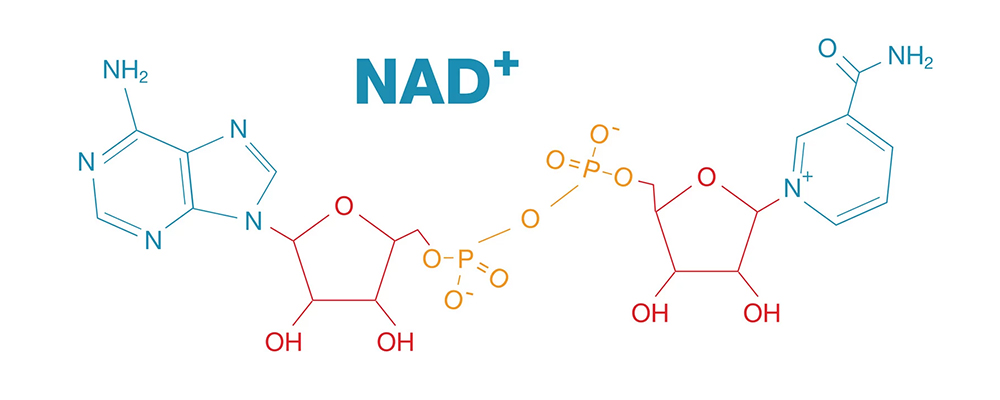
Short for Nicotinamide Adenide Dinucleotide, NAD+ is a coenzyme that is found in every cell in your body. In simple biochemistry terms, a coenzyme is something that is necessary in order to make stuff happen. NAD+ shares and shuttles electrons to create gradients that help make ATP, our cellular form of energy, which is then used to make lots of stuff happen. NAD+ also works with other enzymes systems (most notably, Sirtuins), which are involved in cellular function and biological processes that affect longevity and the aging process.
Here’s an analogy that might be helpful: Think of NAD+ as a really good wedding planner. In charge of a very large wedding. If you’ve ever been married or planned a wedding, you likely understand the very long and daunting list of tasks that goes into planning such an event: Coordinating the guest list, organizing all the vendors, knowing exactly where and when to place things and people (and maybe dogs!), knowing what fits (and what doesn’t!), understanding the importance of decor and ambience, ensuring the comfort and happiness of all guests (for the entire evening!), making sure Uncle Hal doesn’t end up falling into the cake, and being able to avoid any and all unwanted circumstances. There’s an extremely large number of tasks to accomplish, a very large number of people to keep in mind and coordinate with, and it’s all done seamlessly with a perfect vision in mind.
What is NAD+ responsible for?
Much like our world-class wedding planner, NAD+ is central to over 500 reactions (that we know of so far!), making it a primary driver in cellular function and metabolism. It impacts almost all processes of cellular function, helping to convert food into energy, protecting our DNA from damage, and protecting us from disease and premature aging. NAD+ is essential for life – if we can’t make it, we can’t survive.
In a nutshell, here are some of the many
things NAD+ can do:
-
-
- Supports mitochondrial function
- Repairs damaged DNA
- Reduces inflammation
- Boosts energy
- Improves metabolism
- Regulates circadian rhythm
- Reverses insulin resistance
- Combats the aging process
- Supports brain health
- Supports neuroregeneration
- Increases memory and concentration
- Diminishes brain fog and improves mental clarity and alertness
- Improves athletic performance
- Supports a healthy immune system
- Prevents risk of disease
-
What causes NAD+ levels to decrease?
NAD+ levels naturally decline with age. Levels can also decrease prematurely with high stress levels, illness, environmental toxin exposures and excessive alcohol consumption.
How can I increase or naturally support
healthy levels of NAD+?
It should be no surprise that, when it comes to enhancing longevity and healthspan, certain lifestyle habits can serve as a way to obtain higher amounts of the anti-aging benefits of NAD+. Most notably, exercise and caloric restriction are amongst the most effective. IV administration or injections of NAD+ are also supplemental options to improving metabolic health.
